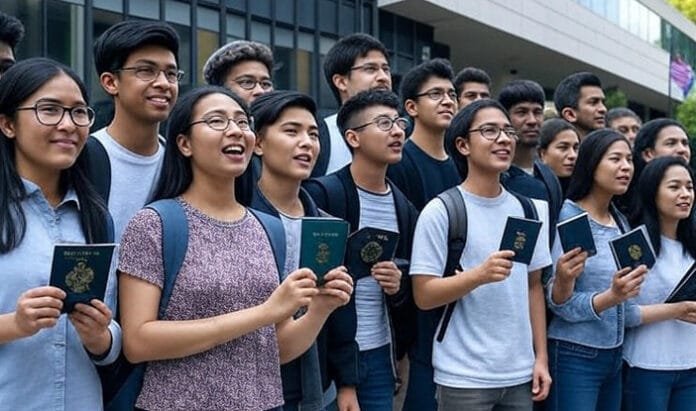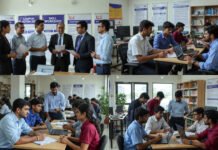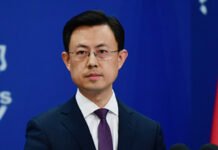
The United States has officially reopened its student visa application process for foreign nationals seeking to pursue education at American institutions. This development, announced by US State Department Deputy Spokesperson Mignon Houston, marks a significant step for aspiring international students—especially from countries like India, China, South Korea, Nigeria, and Brazil—who have been waiting eagerly for clarity regarding their visa eligibility.
A Major Relief for International Students
The recent announcement is a welcome relief for hundreds of thousands of students worldwide. The U.S. had previously suspended the visa process in May, but now, the student visa system is operational again. The resumption comes with a call for transparency, responsibility, and full adherence to immigration policies.
Deputy Spokesperson Houston confirmed, “Student visa applications are now open, and we encourage eligible foreign students to apply.” However, she was equally clear about the conditions and responsibilities that come with receiving a U.S. visa.
Strict Compliance With Visa Purpose Expected
International applicants must understand that their visa approval is tied directly to their academic intent. The United States is urging students to respect the terms of the visa. This means foreign nationals must pursue their studies without engaging in unlawful activities, such as:
Participating in campus vandalism
Engaging in substance abuse
Attending institutions for reasons other than education
Becoming involved in anti-national conduct
Any deviation from the designated purpose could lead to immediate revocation of visa status and deportation.
National Security at the Core of Every Decision
The U.S. government maintains that national security is central to all immigration decisions. According to the State Department, all policies are in place to ensure that only those who meet the high standards of American immigration law are granted entry.
This includes evaluating:
Intent of stay
Background history
Online behavior
Security risks
The United States aims not only to protect its citizens but also to maintain a safe and respectful environment for other international students already enrolled.
New Requirement: Public Social Media Review
One of the most critical updates in the visa application process is the requirement for students to make their social media accounts public. This policy allows U.S. consular officers to review:
Public posts and comments
Private and group affiliations
Attitudes towards U.S. governance, laws, and culture
History of violent or extremist rhetoric
Any content deemed anti-American, hostile, or inflammatory may result in visa denial. This is being implemented to prevent misuse of student visas and maintain the integrity of U.S. campuses.
Who Can Apply for a US Student Visa in 2025?
To be eligible for a U.S. student visa (F-1 or M-1 category), the applicant must:
Be accepted by a SEVP-certified institution
Have proof of financial ability to cover tuition and living expenses
Show intent to return to their home country after education
Provide a valid I-20 form from the institution
Be free of any criminal background
Submit to public social media scrutiny
These criteria are strictly enforced. Any attempt to bypass the process or submit misleading information will lead to visa refusal and potential blacklisting from future applications.
The Visa Interview: What to Expect
The visa interview remains a crucial component of the process. Applicants must:
Present original documents (I-20, passport, financial proof)
Be ready to explain why they chose the U.S.
Provide clear career goals
Demonstrate non-immigrant intent
Answer questions about academic history and English proficiency
The interviewer has the authority to approve or deny the visa on the spot, based on discretion and any red flags in documentation or behavior.
Tips for a Successful Application
To boost your chances of success:
Make your social media accounts clean and consistent with your academic goals.
Avoid political or controversial content online that may be misinterpreted.
Have clear, verifiable proof of financial ability (bank statements, sponsor letters).
Prepare thoroughly for the visa interview, especially questions about your course, university, and post-study plans.
Ensure your intent aligns with U.S. immigration policy: strictly for academic purposes.
Special Advisory for Indian Students
India continues to be one of the largest sources of international students in the U.S. The U.S. embassy and consulates in New Delhi, Mumbai, Hyderabad, Chennai, and Kolkata have resumed student visa appointments for F-1 and M-1 categories.
Important points for Indian applicants:
Check availability of interview slots immediately—appointments are limited.
Verify SEVIS activation before the interview.
Prepare for questions related to U.S.-India diplomatic policies, especially for those in sensitive academic fields (like nuclear studies, AI, cybersecurity).
Consequences of Misuse or Policy Violations
The U.S. government is clear: Student visas are not loopholes for illegal immigration. Misuse of the visa may lead to:
Visa cancellation
Immediate deportation
Lifetime entry bans
Legal prosecution under federal law
The administration will take swift and strict action against violators, and universities are being instructed to report suspicious or non-compliant behavior.
What Happens After Arrival in the U.S.?
Upon arrival:
Students must report to their institution within 30 days
Update their SEVIS status
Maintain full-time enrollment
Notify the university and DHS of any address or program changes
Failure to follow regulations can result in termination of student status.
Final Takeaways for 2025 Student Visa Applicants
The U.S. remains open and welcoming to genuine students seeking world-class education.
Applicants must be transparent, honest, and focused on academic pursuits.
All visa decisions are grounded in national security and lawful conduct.
Social media transparency, intent validation, and institutional accountability are key.
This is an opportunity, not a loophole—and those who treat it as such will benefit greatly from studying in the United States.














